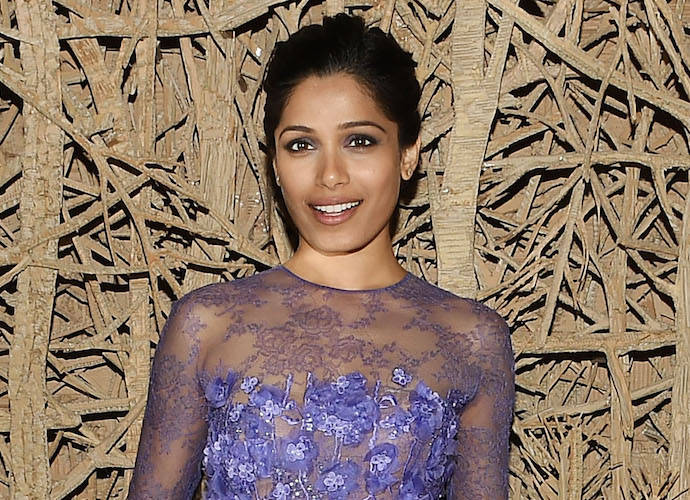Freida Pinto On ‘Desert Dancer,’ Iran’s Ban On Dancing
In Desert Dancer, Freida Pinto plays a dancer who joins an underground dance company in Iran, where there’s a ban on the art.
Freida Pinto On ‘Desert Dancer’
Pinto’s character Elaheh joins the passionate Afshin Ghaffarian (Reece Ritchie), who has great ambitions of succeeding as a dancer, despite his country’s ban. In many of her scenes, Pinto has to perform complex dances that look up to par with Elaheh’s supposed talents. According to Pinto, who had never trained professionally as a dancer, learning the choreography was far more difficult than she had imagined.
“Everything was just you know me thinking I was this ace dancer, that I could do anything. And I’m pretty boisterous when it comes to my own ideas and so I go, ‘Yeah of course I’ll be able to do this, when are we going to start training?'” Pinto told uInterview in an exclusive interview. “And then when I actually got to train, to start with a trainer and a choreographer, I realized how difficult it is.”
In between training as a dancer, Pinto had to find time to research another aspect of her character – her addiction to heroin. Along with director Richard Raymond, Pinto attended Narcotics Anonymous meetings to speak with people who were recovering from such addictions. However, the Slumdog Millionaire star found it even more helpful to talk to the counselors.
“It’s not always easy to access heroin addicts or recovering heroin addicts, and also it’s a very sensitive subject matter. So what I felt was, I was going to learn a lot more from counselors,” Pinto explained. And one of the things that they told me, which I think has stuck with me, and I’ve always known, but not in the way she described it. She tried to explain to me why there are some people who can try a drug and never go back to it again and why there are some people who will try a drug and will go back to it again. And so it was really all a learning experience and she really helped me a lot.”
Desert Dancer is the latest in a string of thought-provoking independent films that Pinto has signed on for in recent years. As an actress and activist, getting to work on a film in which she is able to learn a great deal about a human rights issue she’d not known too much about is something that Pinto sees as a privilege of her profession.
“I did not know there was punishment and the fear of getting arrested and it was that severe. I had no idea that it was a real violation of human rights. I kind of felt stupid as well, that I lived in this state of not knowing, or rather knowing only versions of news channel reports and media reports,” Pinto told uInterview. “This film really taught me a lot and there was a lot of learning to do. I love projects that really expose me to different sides of humanity, a different side of the world that I would have never know if it was never for a film project.”
Desert Dancer is currently in limited release.
So, I play Elaheh in the film. She’s a rebel and the only trained dancer among the group. There are a couple of words that I use to describe her, but one of the words I find best to describe her is the word “outsider.” She never really fits in and never really tries to fit in – and not because she does not want friends or does not want to be a part of a group. It’s because of her own demons. She’s a constant escapist, I kind of find. She’s not weak, but I find her strength in her beauty as well as in her ugliness.
No. Nothing professional. Everything was just you know me thinking I was this ace dancer, that I could do anything. And I’m pretty boisterous when it comes to my own ideas and so I go, “Yeah of course I’ll be able to do this, when are we going to start training?” And then when I actually got to train, to start with a trainer and a choreographer, I realized how difficult it is. So yes, it took me about a year to get to that place in the film.
Yes, when I was in London, the director and I went to a lot of the NA meetings over there to meet people who were recovering. And, the other thing that I did was actually spend a lot of time with counselors. It’s not always easy to access heroin addicts or recovering heroin addicts, and also it’s a very sensitive subject matter. So what I felt was, I was going to learn a lot more from counselors. And one of the things that they told me, which I think has stuck with me, and I’ve always known, but not in the way she described it, she said “Well, really there is a wrong idea of drug addiction in this world. Everybody thinks that you’re just hooked onto the substance, but it’s not just the substance, it’s an addictive personality. And there are always signs of it that you can actually find even in early childhood or early adulthood.” And she tried to explain to me why there are some people who can try a drug and never go back to it again and why there are some people who will try a drug and will go back to it again. And so it was really all a learning experience and she really helped me a lot.
Not to this extent. I did not know there was punishment and the fear of getting arrested and it was that severe. I had no idea that it was a real violation of human rights. I kind of felt stupid as well, that I lived in this state of not knowing, or rather knowing only versions of news channel reports and media reports. So, this film really taught me a lot and there was a lot of learning to do. And I love projects that really expose me to different sides of humanity, a different side of the world that I would have never know if it was never for a film project.
RELATED ARTICLES
Get the most-revealing celebrity conversations with the uInterview podcast!









Leave a comment